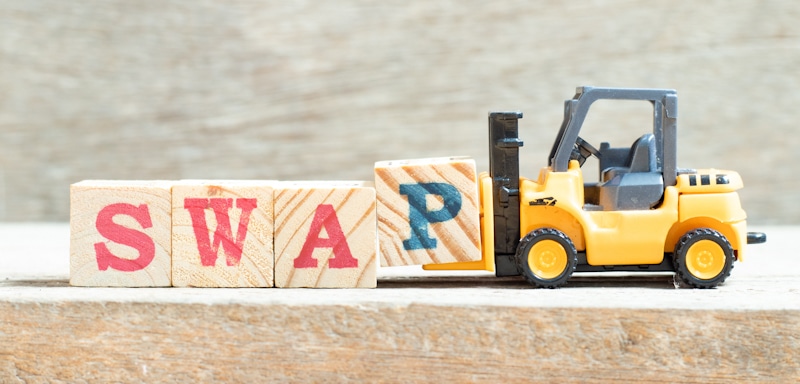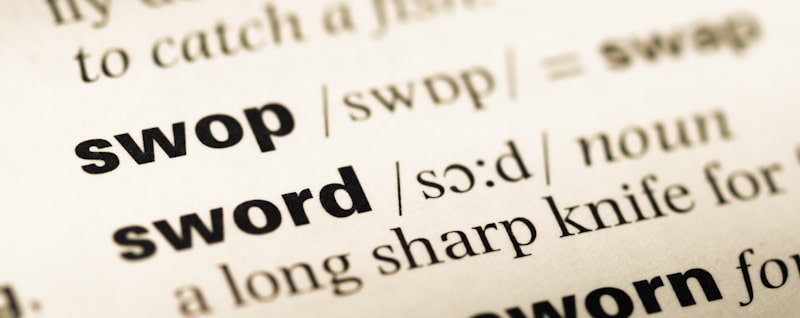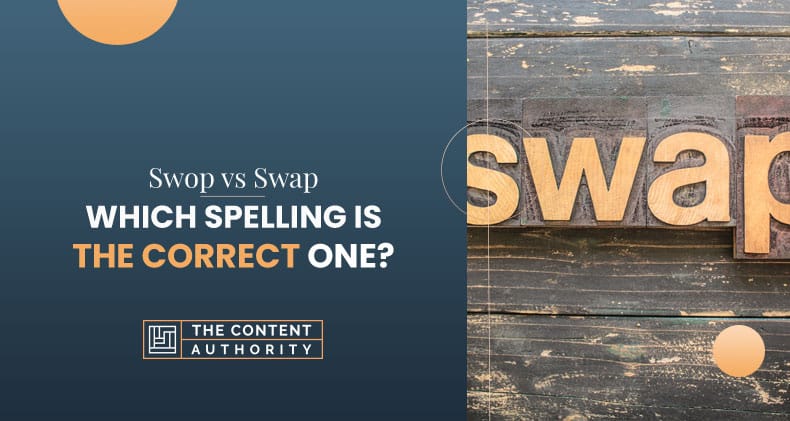We swap things all the time. Even that morning coffee you picked up on the way to work involved a swap – you exchanged paper bills or coined currency for the cup of coffee you obtained in its place. But does that mean that “swap” is the only word to describe this trade between belongings?
Swapping means making an exchange; giving something in trade to receive something we want, finding it equally valuable or even profitable. It means switching one thing for another. “Swop” is also a word, and it means all of those mentioned above, but you’ll find its use depends mainly on geography.
Where Does “Swap” Originate From?
By the Mid-12th century, the word “swappen” meant to suggest the act of striking hands together. In a way, it was a precursor to what we call a handshake or a high-five. But then, a short century later, in the 13th century, it came to mean to strike something or someone. You could argue that at this place in time, it meant no different from a slap.
It was not until the 15th century that the word adopted the sense of trading, bartering, or exchange, and this is all derived from the meaning it previously had. The phrase “striking a bargain” or “strike a deal” started becoming mainstream, thus adjusting the word to connote the act of making a deal and closing it with a handshake or swapping of hands. Over time, the swapping of hands became the swapping of goods.

What Does It Mean to “Swap”?
As a verb, “swap” means switching something you own with someone else who is interested in trading what they have for what you have. You can use it to describe any action that requires two parties to exchange something of value, and if we can remove the legal context this following phrase has, we can explain swapping as quid pro quo. Quid pro quo can have overtones of bribery and favor exchanging, but it still means to receive or give something in exchange for something else in its purest form.
Swap also makes paid appearances on financial contracts under which two parties or companies switch liabilities or cash flows from different financial instruments as part of a mutually beneficial agreement. It could take the form of a loan, a bond, or a debt settlement, but the resources exchanged can be almost anything. These clauses are called: debt swaps, swap trading, or just swap option.
What Is “Swop” and How Is It Different?
Now, let’s address “swop” by saying it is not an obsolete conjugation for “swap” but a current word used right now, even though you may have never heard it used in a sentence. It means to trade, exchange and barter in the same manner that “swap” does but its spelling and pronunciation are chiefly British.
For example: “We can swop our seats when at the cinema” is a pretty British thing to say, so we can Americanize it by saying: “We can swap our seats when we get to the movies.”
In a way, it works the same way we spell “humor” in North America. If we spell it this way, it carries the same meaning all over the world, and you would not be wrong in using it like this anywhere. On the other hand, if you were in the United Kingdom, you may encounter that the appropriate spelling for the word is “humour.” It has an additional vowel that we have stayed away from using altogether.
Both of these spellings are correct, and they both mean a person who is in a good mood or has the quality of being funny, but in British English vernacular, the phrase carries a “u” at the end that the American English version does not. You can notice how the way they spell “humour,” “labour,” and “flavor” has a somewhat French ring to it, and this is because the UK has absorbed words from neighboring countries such as Germany and France. Perhaps no different from how we have adopted Spanish words like “taco” or “burrito” as second nature here in the United States due to our proximity to Mexico. British settlers brought the English language to America in the 17th century. When we gained independence from them in 1776, we made deliberate changes to nearly everything they had instilled in us. Language, being primordial as it is, was at the center of some of these changes.
We chose to reject the European undertones that the British settlers brought with them in their language when they colonized our country, all to create our own identity. This translated into adjustments to many aspects of the now primarily original culture we proudly call Americana. From architecture and festive traditions to core structures such as our political system, all were subject to modifications as we looked to widen the gap between being a former colony and our own separate country.
Noah Webber is the American man responsible for many of these grammatical changes when, in 1928, he wrote the first American Dictionary. The basis of many of his ideas came from the fact that the spelling of words should be more like they sound. Henceforth, we ditched the extra vowel as we deemed it an unnecessary aesthetic, phonetically speaking. To do this, we had to lose the German and French influence present in the way we spelled some words when we acquired them.

What Other Words Received This Same Treatment?
Examples of other words we slightly modified would be: “colour,” “analyse,” “leukaemia,” and “defence,” and these came to be precursors to “color,” “analyse,” “leukemia,” and “defense,” respectively. These words are technically interchangeable with one another, but it becomes a matter of geography and culture. We removed some other observations from our vocabulary entirely, like needn’t, which is rarely used in American English. Other not so drastic changes would be our use of the term “shall,” which we exchanged for the more informal “will” or “should.” This last example should come as no surprise given how notoriously formal the British can be.
What Is An Onomatopoeia?
Now, this case is different from other words in that it has an onomatopoeia feel to it. These are the words that unwittingly suggest, resemble, or imitate the sound source that it is describing. The words “swap” and “swop” have this quality in that one can almost imagine the sounds the wind makes when things are switched rapidly to each other. Perhaps you’ve seen this kind of phenomenon if you’ve ever read a comic book, such as when Batman strikes his foe, and the panel would explode “POW” or “WHACK.”
Even if you’re not an avid comic book enthusiast, there are other words that we use that have this same quality, such as “honk,” “clang,” “boom,” and “zap.” When we say something went boom, most people would understand that something has exploded. A perfect example of how these types of words apply to our daily word soup for use. I, for one, honk my horn nearly every day.
Examples
- Mary said she would swap her chocolate cake for your vanilla bean cheesecake.
- I thought that you and Alexandra chose to swap your dresses. What happened?
- My final decision was to swap the two in their current positions.
- “There is an illegal swap of substances going on in that alley,” the detective answered.
- Please swap your sandwich for my burger. I love peanut butter.
- We arranged a swop with Paul. It wasn’t the best idea ever.
- It is best if you do not swop those mops while cleaning the floors.
- If it ever crossed your mind to swop your lunch with me, tell me.
- Let’s swop lip gloss, lord knows that is my color.
- This underwear was a swop I got from Hector.
Final Thoughts
These words and their uses are interchangeable. “Swopping” and “swopped” are just as good as “swapping” and “swapped.” It depends on where you are in the globe or perhaps your upbringing. However, we can use them, but keep in mind that people may think that you are not American if they catch you using “swop” in a sentence.
Shawn Manaher is the founder and CEO of The Content Authority. He’s one part content manager, one part writing ninja organizer, and two parts leader of top content creators. You don’t even want to know what he calls pancakes.

